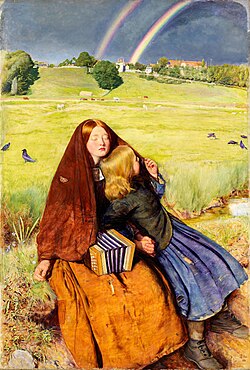This is an old revision of this page, as edited by 92.98.24.125 (talk) at 18:49, 14 November 2011 (rv- the previous revision looks better. You were told this before, and you ignored it. Wiktionary explains the word, TOC on the right makes sense to make the page shorter, etc. Hope this helps.). The present address (URL) is a permanent link to this revision, which may differ significantly from the current revision.
Revision as of 18:49, 14 November 2011 by 92.98.24.125 (talk) (rv- the previous revision looks better. You were told this before, and you ignored it. Wiktionary explains the word, TOC on the right makes sense to make the page shorter, etc. Hope this helps.)(diff) ← Previous revision | Latest revision (diff) | Newer revision → (diff)An itinerant is a person who travels from place to place with no fixed home. The term comes from the late 16th century: from late Latin itinerant (travelling), from the verb itinerari, from Latin iter, itiner (journey, road).
Types of itinerants
- Drifters (rogues, rovers, vagabonds, vagrants)
- Perpetual travelers, including illegal aliens (migrants)
- Nomads, including hunter-gatherers and gypsies
- Hobos, including tramps, bums, derelicts
- Refugees and displaced persons
- Street people (street children, paupers, squatters, waifs, schnorrers)
- World citizens
Itinerants throughout history and today
- Freight Train Riders of America (freighthoppers in United States)
- Romani people
- Various indigenous peoples (indigenous peoples, including uncontacted peoples)

- Afar people in Horn of Africa
- Bajau people of Philippines
- Banjara of India
- Bedouin (nomadic Arab people of the desert)
- Beja people in North Africa
- Bushmen of Southern Africa
- Dom people in North Africa and Western Asia
- Eurasian nomads of Eurasian Steppe
- Ghilzai in South-Central Asia
- Indigenous Australians
- Indigenous Norwegian Travellers
- Indigenous peoples of the Americas
- Irish Travellers
- Kuchi people of Afghanistan
- Nomads of India
- Pygmy peoples in Equatorial Africa and parts of Southeast Asia
- Quinqui in northeren half of Spain)
- Scottish Travellers
- Yeniche people in Europe
- Carnies (travelling show-people)
- Hippies, including New Age travellers and Rainbow Travellers
- Jossers (circus artists)
- Kobzari (musicians of Ukraine)
- Lightermen (bargees in England)
- Peredvizhniki (realist artists of Russia)
- Swagmen (homeless transients in Australia and New Zealand)
- Circuit riders and Gyrovagues (Christian ministers and monks)
- Bhikkhus (Buddhist monks)
- Mendicants (beggars of Christianity, Hinduism, Islam, Jainism and Buddhism)
- Pilgrims (religious travellers)
- Sadhus (Jain monks)

Notable itinerants
- Alexander Supertramp
- Kinga Freespirit
- Albert Einstein
- Democritus
- Diogenes of Sinope
- Friedrich Nietzsche
- Jean-Jacques Rousseau
- Mohandas Karamchand Gandhi
- Paul Erdős
- Gautama Buddha
- Historical Jesus
See also
References
- Itinerant Synonyms, Itinerant Antonyms at Thesaurus.com
- Definition of itinerant from Oxford Dictionaries Online
Further reading
- Jack Kerouac (1957). On the Road. Viking Press. ISBN 0-14-118267-9.
- Rolf Potts (2002). Vagabonding: An Uncommon Guide to the Art of Long-Term World Travel. Villard Books. ISBN 0-81-299218-0.